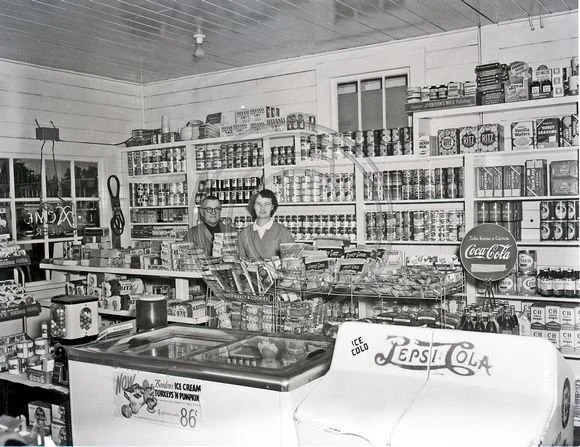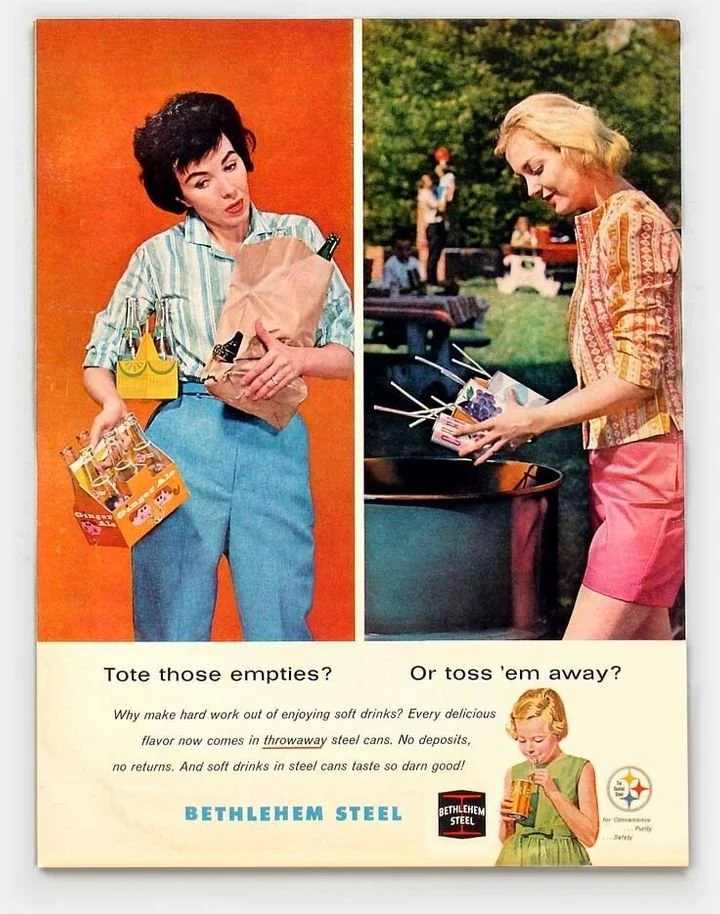How sloths and people benefit from a plastic-free future
You may have heard of or remember a time when milk was delivered in glass bottles to your doorstep. In the span of a lifetime (80 years), we have gone from reusing and repairing most of our possessions to one where disposable products are the norm.
Milkman truck from the 1940s/Source: https://historydaily.org/vintage-photos-milkmen-throughout-history
Our grandparents’ generation lived a -mostly- plastic-free life. Leading brands such as Coca-Cola are still reluctant to go plastic-free./ Photo: oldphotoguy.com
The origins of modern garbage
This shift occurred for a variety of reasons: a coalescing of forces that led to a boom in consumerism post WWII and a desire on the part of businesses to harness this sudden rise in consumption to maximize profit.
The strategy that they devised was an unobvious one. In a pivotal moment at a plastics industry conference in 1956, a speaker looked out on the crowd and said, “your future is in the garbage wagon.” Instead of creating products that would last, the speaker proposed that they needed to create products that were intended to be thrown away.
It was a brilliant tactic. If they could simply get people to throw things away, then they would come back to buy more.
People had to be taught to throw things away. There were a variety of education campaigns at the time explaining to consumers how to throw things away and manage their garbage.
The unknown future of plastics
Although plastics in the ocean break down much faster than we expected , no one is sure how long plastic will persist in our ecosystems, due to their tendency to break up into smaller pieces.
The study of plastics and their effect on the environment has largely been focused on marine ecosystems (due to the visibility of plastic in the ocean and its dramatic implications for marine and human life). Only as recently as 2012 have we begun to evaluate the effect of plastics on soil and plants.
As plastic breaks down into smaller pieces, they are eaten by marine life, entering the food chain and threatening the health of marine animals and humans alike./Infographic: WWF
Our understanding is still a theoretical one. As plastics break down into smaller and smaller pieces, the likelihood that they can leach harmful chemicals into the environment increases.
Phytoremediation is the deliberate use of specific plant species to remove, stabilize or break down contaminants in the soil. Given that plants have the ability to absorb harmful compounds in the soil, such as arsenic, it likely that they also have the capacity to absorb nanoplastics in the soil.
A recent review of research on the effect of plastics on terrestrial ecosystems concluded that, "At present, we know next to nothing about the effects of this factor of global change on plants."
An overview of pollutants and their potential for phytoremediation/ Source: Kate Kennan and Niall Kirkwood’s book PHYTO: Principles and Resources for Site Remediation and Landscape Design
Eliminating plastic safeguards the health of ecosystems and humans alike
Among the harmful chemicals that plastics are known to release are endocrine disruptors, a class of chemicals which mimic our human hormones, such as estrogen, resulting in a variety of health consequences for humans and other animals. As plastics break down in the ocean, they also release a variety of chemicals like bisphenol A (BPA) which threaten the lives of marine animals and the people that eat them. Unfortunately, even low doses of these chemicals can cause adverse health effects, such as cancer.
Banning single-use plastics: A case study in Kenya
In addition to the changes that can be made on the scale of the consumer, many cities and countries have banned the use of single-use plastic. Notably, in 2017, the entire country of Kenya banned single-use plastic bags. Prior to the ban waterways clogged with plastic would often lead to floods. Since the ban of plastic bags, there has been a notable reduction in the amount of plastic in the streets and common areas that once had plastic waste piled as high as a person.
In urban areas in Kenya as much as 50% of cows had plastic bags in their stomachs/Photo: BBC
Read more: 7 ways you can help the sloths today!
How sloths benefit from a plastic-free future
It is likely that sloths benefit from less plastic pollution in their environment. However, plastics pose the greatest threat to sloths and humans alike by generating profits for the fossil fuel industryand thus fueling our climate crisis. Plastics are derived from fossil fuels, such as crude oil. As our consumption of plastic rises, it is quickly becoming the primary driver of oil demand globally.
Sloths have survived on earth for almost 64 million years. Their winning strategies: moving slowly and saving energy. In order to save energy, they have lost the ability to regulate their body temperature. Their internal body temperature depends on the environment and can change by 10 ◦C over the course of a day.
If it becomes too cold for sloths, the essential microbes in their gut can die and they can starve to death on a full stomach. Curiously, when temperatures become too high, the metabolism of sloths begins to decrease.
Sloths are particularly vulnerable to the increased variation in temperatures in tropical countries due to climate change. Because they lack the ability to regulate their internal body temperatures, they heavily depend upon the temperature of the environment.Reducing our plastic consumption individually and collectively reduces our exposure to harmful chemicals while combating climate change. Moreover, reducing our consumption of plastic helps to safeguard the future of the vulnerable: sloths and people alike.
A plastic free-future
It may be disheartening to realize that the immense amount of plastic pollution that we and our ecosystems face today stemmed from a deliberate plan to maximize profits.
However, if we learned how to throw things away, we can learn how to reuse them again.Eliminating plastic from your life may seem like a daunting task. Fortunately, we don’t have to start from scratch. Organizations such as Plastic Freedom, with their line of plastic-free products, are dedicated to bringing about a future without plastic.
They offer plastic-free alternatives ranging from toothpaste to dental floss to razors. There is a good chance that the item you are looking for comes in a refillable version free from plastic.
Moreover, for every order they receive, they plant a tree somewhere in the world. These trees help to restore habitat and replenish the natural resources that we depend upon.
Plastic-free alternatives prevent exposure to health-threatening chemicals while reducing your ecological footprint. Even in the context of our global pandemic, fabric masks can be safely used as an alternative to disposable ones.
Some big brand shops have begun taking steps to strip their shelves of plastic wrapping. / Photo: phys.org
What ideas do you have to reduce your use of plastics in your life? Every small action counts!










